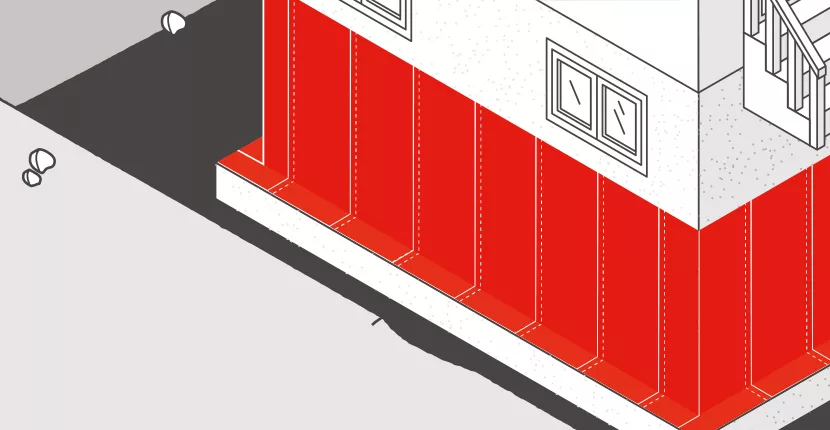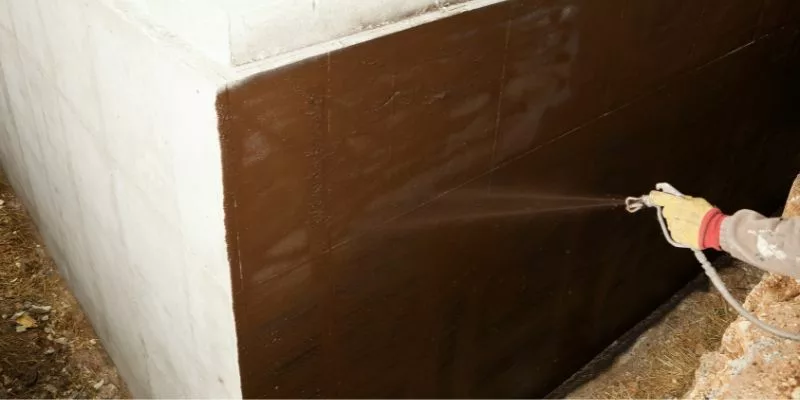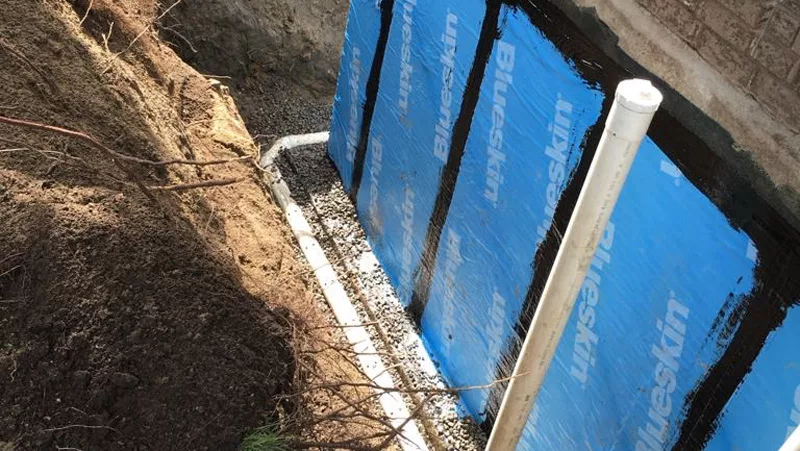Waterproofing Membrane
Waterproofing a building foundation means taking steps to prevent water from penetrating the ground structure and damaging the foundation. This is crucial to ensuring the long-term stability and durability of the building, as water can cause problems such as ground subsidence, foundation cracks, mold, and other structural damage.
Why have your foundation waterproofed?
Waterproofing a building’s foundation is a crucial step in the construction or renovation process. Here are some of the reasons why it is important to waterproof your foundation:
- Prevention of water infiltration: Waterproofing prevents water from penetrating the foundation. This is essential to avoid problems with humidity, mold and water damage inside the building.
- Structural stability: Water seeping into the foundations can cause structural problems, such as ground subsidence, cracks in walls and floors, which can compromise the overall stability of the building.
- Prevention of wood rot: If your building has wooden elements, constant humidity due to water infiltration can lead to wood rot. Waterproofing protects these materials from premature degradation.
- Mold prevention: Constant humidity encourages mold growth. By waterproofing the foundation, you reduce the risk of mold inside the building, which can have implications for the health of occupants.
- Increased energy efficiency: Some waterproofing coatings can also act as thermal insulators, helping to regulate the temperature inside the building. This can contribute to better energy efficiency.
- Protection against freeze/thaw damage: In areas where temperatures drop below freezing, water that enters the foundation can freeze and cause structural damage as it expands and contracts.
- Preservation of indoor air quality: Waterproofing helps maintain a dry indoor environment, thereby reducing the risk of mold and improving the air quality inside the building.
- Extension of the lifespan of the structure: By preventing problems with humidity, mold and structural degradation, waterproofing helps extend the overall lifespan of the building.

In summary, waterproofing a building’s foundation is an essential proactive measure to prevent various structural problems, improve the quality of life inside the building, and ensure the long-term durability of the structure.
The main stages of waterproofing a foundation usually include:
- Soil preparation: Ensure that the soil around the foundation is properly compacted and leveled.
- Adequate drainage: Install an appropriate drainage system to evacuate rainwater away from the foundation. This may include French drains, perforated pipes, or other drainage devices.
- Application of waterproof coatings: Apply waterproofing materials to the exterior surface of the foundations. These coatings may take the form of bituminous membranes, liquid waterproofing coatings, rubber membranes, or other products specifically designed to prevent water infiltration.
- Thermal insulation: Some waterproofing materials can also provide thermal insulation, helping to regulate the temperature inside the building.
- Protection against soil moisture: Install a moisture barrier between the ground and the foundation to prevent rising humidity.
Waterproofing is an essential step when constructing a building to avoid costly water-related problems in the long term. It can also be carried out retrospectively in the event of water infiltration problems detected in an existing structure.
At Xpert Excavation, we have 2 options available to waterproof your foundation
Option 1: Polyurethane and polyurea

Using polyurethane and polyurea to waterproof a foundation has several advantages:
- Effective waterproofing: Polyurethane and polyurea are very effective materials for sealing and waterproofing foundations. They form a waterproof barrier which prevents water infiltration, thus leading to the risk of leaks and moisture infiltration.
- Flexibility: These materials are flexible and can adapt to the natural movements of the soil and foundation without cracking. This makes them outstanding for areas subject to ground movement or vibration, ensuring long-lasting waterproofing.
- Durability: Polyurethane and polyurea are strong and durable materials. They can withstand temperature variations, bad weather and chemical attacks, thus ensuring long-term protection of the foundation.
- Easy Application: These materials can be applied relatively quickly and easily. They can be sprayed onto the surface of the foundation, allowing large areas to be quickly covered or access to hard-to-reach areas.
- Adhesion: Polyurethane and polyurea adhere well to different types of surfaces, including concrete, brick and stone. This ensures a strong bond between the waterproofing material and the foundation, leading to the risk of delamination or failure.
- Versatility: These materials can be used to waterproof different types of foundations, whether new construction or renovations. They are also suitable for a variety of applications, including basement walls, concrete slabs, decks and swimming pools.
Both polyurethane and polyurea membranes are used as waterproofing coatings in various applications, offering several advantages due to their specific properties. Here are some of the benefits associated with these two types of membranes:
Advantages of polyurethane membrane:
- Flexibility: Polyurethane is known for its flexibility, making it suitable for surfaces that may experience movement or deformation.
- UV resistance: Polyurethane membranes resist ultraviolet rays well, making them durable and suitable for exterior applications.
- Adhesion: Polyurethane membranes adhere well to a variety of surfaces, making them easy to apply to different substrates.
- Elasticity: They are elastic, which allows better absorption of movements of the structure without cracking.
- Thermal insulation: Some polyurethane membranes can also provide thermal insulation, helping to regulate temperature.
Advantages of polyurea membrane:
- Chemical resistance: Polyurea is resistant to many chemicals, making it a suitable choice in industrial environments where exposure to chemicals is common.
- Fast Curing: Polyurea has the ability to cure very quickly after application, allowing for rapid installation and minimizing downtime.
- Instant seal: Due to its rapid curing, polyurea provides an almost instant seal, reducing the risk of water infiltration during the application process.
- Abrasion resistance: Polyurea is known for its resistance to abrasion, making it suitable for surfaces subject to significant wear.
- Adaptability to extreme temperatures: It can maintain its mechanical properties at extremely low or high temperatures, making it versatile in different climatic environments.
Option 2: Blueskin WP200 membrane

Blueskin WP200 membrane is a self-adhered waterproofing membrane commonly used in construction to protect foundations, buried walls and other surfaces from water infiltration. Here are some of the specific benefits associated with using the Blueskin WP200 membrane:
- Effective waterproofing: Blueskin WP200 membrane provides a waterproof barrier that prevents water from penetrating the structure, protecting foundations and walls from moisture-related problems.
- Self-adhesive adhesion: The membrane is self-adhesive, facilitating its installation by fixing it firmly to the surface without requiring the application of additional glue.
- Flexibility: The Blueskin WP200 membrane is designed to be flexible, which allows it to adapt to movements and possible deformations of the structure without cracking. This makes it a suitable choice for varied conditions.
- UV resistance: Certain types of Blueskin WP200 membranes are formulated to resist ultraviolet rays, which increases their durability in outdoor environments exposed to sunlight.
- Puncture Resistance: The membrane is designed to be puncture resistant, which improves its durability and reduces the risk of damage during and after installation.
- Cold Application: Blueskin WP200 membrane can often be installed cold, eliminating the need for heating or other special procedures during the application process.
- Rapid curing: After installation, the membrane can generally cure quickly, providing almost immediate protection against water infiltration.
- Versatility of use: The Blueskin WP200 membrane is versatile and can be used for waterproofing foundations, buried walls, exterior walls, and other similar applications.
- Compatibility with different surfaces: It generally adheres well to a variety of surfaces, allowing its use on different types of substrates.
